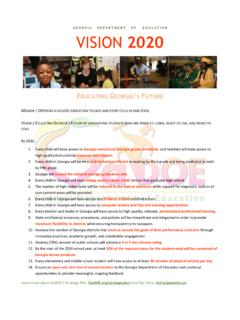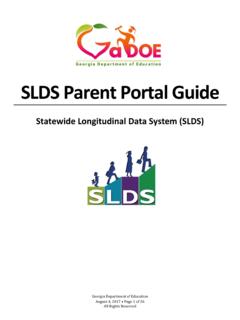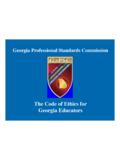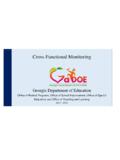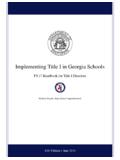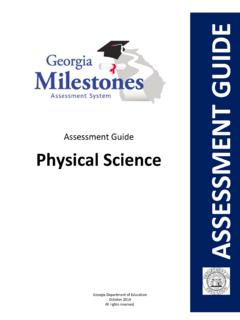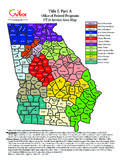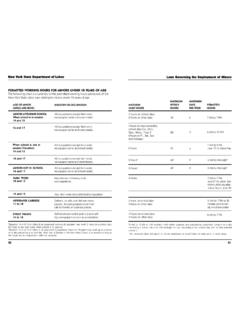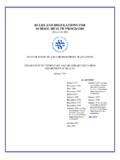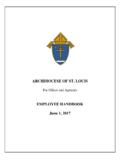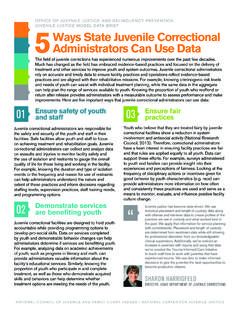Transcription of Code: JBC 160-5-1-.28 STUDENT ENROLLMENT …
1 Code: JBC STUDENT ENROLLMENT AND withdrawal (1) DEFINITIONS. (a) Active Duty the full-time duty status in the active uniformed services of the United States, including members of the National Guard and Reserve on active duty orders pursuant to 10 Sections 1209 and 1211. (b) Attend a STUDENT s physical or virtual presence in the educational programs for which he or she is enrolled. (c) Case Management Consultation (CMC) a consultation by a school social worker or case manager in which a process is used to discover whether any transition problems exist and whether any services are necessary for a child placed by the Department of Human Services (DHS) or Department of Juvenile Justice (DJJ).
2 (d) Child of Military Families a child enrolled in kindergarten through grade 12, in the household of an active duty military member. (e) Department of Behavioral Health and Developmental Disabilities (DBHDD) an agency which provides specified services for children who have been admitted or placed according to an individualized treatment or service plan directed by DBHDD. (f) Department of Human Services (DHS) an agency which provides specified services and placement for children who have been remanded to the physical or legal custody of DHS either temporarily or permanently by a court or by voluntary agreement, or if the child has been admitted or placed according to an individualized treatment or service plan of DHS.
3 (g) Department of Juvenile Justice (DJJ) the agency which provides supervision, detention and a wide range of treatment and educational services for youths referred to DJJ by the Juvenile Courts, and provides assistance or delinquency prevention services for at-risk youths through collaborative efforts with other public, private, and community entities. (h) Education For Homeless Children And Youths Subtitle B of Title VII of the McKinney-Vento Homeless Assistance Act (42 11431 et seq.) that requires each state to ensure that each child of a homeless individual and each homeless youth has equal access to the same free, appropriate public education as provided to other children and youth.
4 (i) Emancipated Minor an individual under the age of eighteen who is no longer under the control or authority of his or her parents or guardians by operation of law or (Continued) 2 pursuant to a petition filed by the minor with the juvenile court and granted by a judge in juvenile court after the judge determines emancipation is in the best interest of the minor as provided in 15-11-202. (j) Enroll the registration of a STUDENT in the local education agency (LEA) of residence. A parent, guardian, other person residing within this state having control or charge of any child or children, or the STUDENT (in the case of an emancipated minor) provides the LEA with the appropriate documentation.
5 Once enrolled, the child shall be eligible to attend the assigned school. (k) Fictive Kin an individual who is known to a child as a relative but is not in fact related by blood or marriage to such child and with whom such child has resided or had significant contact. (l) Georgia Department of Education (GaDOE) the state agency charged with the fiscal and administrative management of certain aspects of K-12 public education, including the implementation of federal and state mandates subject to supervision and oversight by the State Board of Education. (m) Governor s Office of STUDENT Achievement (GOSA) the state agency mandated by 20-14-26 to create a uniform performance-based accountability system for K-12 public schools that incorporates both state and federal mandates, including STUDENT and school performance standards, and to audit and inspect or cause to be audited and inspected K-12 public schools, and LEAs for the purpose of verification, research, analysis, reporting or for other purposes related to the performance of its powers and duties.
6 (n) Grandparent the parent and/or step-parent of a minor child s father or mother. This definition remains the same upon the death and/or the termination of parental rights of the birth parent. (o) Home Study a program that allows parents or guardians to teach their children at home as provided in 20-2-690 (c). (p) Homeless Child or Youth individuals who lack a fixed, regular, and adequate nighttime residence. The term includes children and youth who are: 1. Sharing the housing of other persons due to loss of housing, economic hardship, or a similar reason; 2.
7 Living in motels, hotels, trailer parks, or camping grounds due to lack of alternative adequate accommodations; 3. Living in emergency or transitional shelters; or 4. Abandoned in hospitals. (Continued) 3 5. The following children are included in the definition; however, this list is not exhaustive: children who have a primary nighttime residence that is a public or private place not designed for, or ordinarily used as, a regular sleeping accommodation for human beings; children who are living in cars, parks, public spaces, abandoned building, substandard housing, bus or train stations, or similar settings; and migratory children who qualify as homeless because they are living in circumstances described above.
8 (McKinney Vento Homeless Act 42 11431 et seq.) (q) Individualized Education Program (IEP) a written plan for each STUDENT with a disability that is developed, reviewed, and revised in accordance with Individuals with Disabilities Education Act, 20 1414(d). (r) Individuals with Disabilities Education Act (IDEA) the federal law, codified at 20 1400, et seq., enacted to ensure that all students with disabilities have available to them a free appropriate public education that emphasizes special education and related services designed to meet their unique needs and prepare them for employment and independent living; to ensure that the rights of students with disabilities and their parents are protected; to assist states, localities, educational service agencies, and federal agencies to provide for the education of students with disabilities; and to assess and ensure the effectiveness of efforts to educate students with disabilities.
9 (s) Kinship Caregiver a grandparent, great-grandparent, aunt, uncle, great aunt, great uncle, cousin, sibling, or fictive kin who has assumed responsibility for raising a child in an informal, noncustodial, or guardianship capacity upon the parents or legal custodians of such child: 1. Losing or abdicating the ability to care for such child; or 2. Being unable to ensure that the child will attend school for reasons, including, but not limited to: (i) A parent or legal custodian being unable to provide care due to the death of a parent or legal custodian; (ii) A serious illness or terminal illness of a parent or legal custodian; (iii) The physical or mental condition of the parents or legal custodians such that proper care and supervision of the child cannot be provided; (iv) The incarceration of a parent or legal custodian; (v) The inability to locate the parents or legal custodians.
10 (vi) The loss or uninhabitability of the child's home as the result of a natural disaster; or (vii) A period of active military duty of the parents or legal custodians exceeding 24 months. (t) Legal Custodian a person that has been awarded permanent custody of a child by court order. (Continued) 4 (u) Local Education Agency (LEA) the public authority legally constituted by the state as an administrative agency to provide control of and direction for kindergarten through Grade 12 public education institutions. (v) in loco parentis to assume the duties and responsibilities of a parent without a formal legal process.
